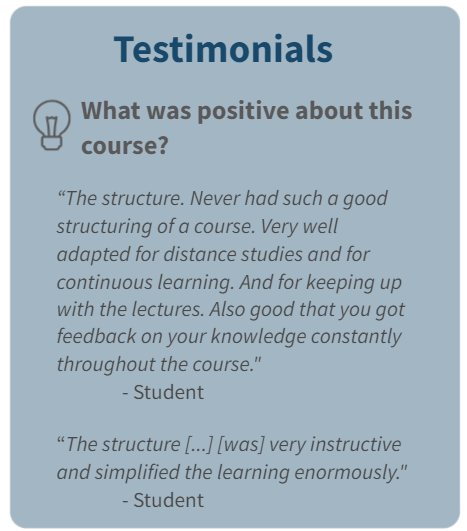Blended education to enhance student learning
Course Summary:
Uppsala University redesigned the Linear Algebra II course to enhance student learning. The new approach aimed to improve conceptual understanding and offer a structured framework for students to process the material effectively. The course adopted blended learning, with pre-recorded lectures and problem-based discussion sessions. Students received continuous feedback through quizzes and longer assignments. The new structure was very well-received. The course was divided into themes, with each instructor recording concise lecture clips. In-person teaching involved more student interaction, dynamic problem-solving, and collaborative exercises.
Course Design: 
The Linear Algebra II course was divided into three themes, each comprising 6 lectures. The instructor adopted one theme and recorded concise film clips containing theory and examples. The former 90-minute lectures were replaced by 2-4 chunks of film clips, totaling around 45 minutes. Students watched the clips before class, for which they were given 45 minutes off from each lecture. In the synchronous classes of 45 minutes, focus was retained on problem-solving and discussions with all students. Online polls further encouraged student engagement. In addition to these lectures, smaller group sessions allowed for focused work on problems with teacher support.
The course assessment was restructured to align with the changes in teaching. Instead of relying solely on final and midterm exams, the new approach introduced quiz questions for each lecture, along with two problem sheets and a midterm exam. The quiz questions were electronically graded and aimed to test basic understanding, so that a student who had understood the main idea of the lecture would get a good score without much effort. Around three such questions accompanied each lecture and were available for a limited time to help students stay in phase with the course. Additionally, more challenging problem sheets were given to assess deeper comprehension and prepare students for future applied courses. An exercise involving drawing a concept map was included to reinforce conceptual understanding.
The final grade was based on performance in quizzes, problem sheets, midterm, and final exams. This new assessment strategy aimed to promote continuous and active participation in the course, while helping students identify areas for improvement and seek targeted assistance during exercise sessions.
In the following video, you can watch designers of the course explain their motivations, processes and experiences of implementing the course.
Contact person
Prof. Seidon Alsaody
